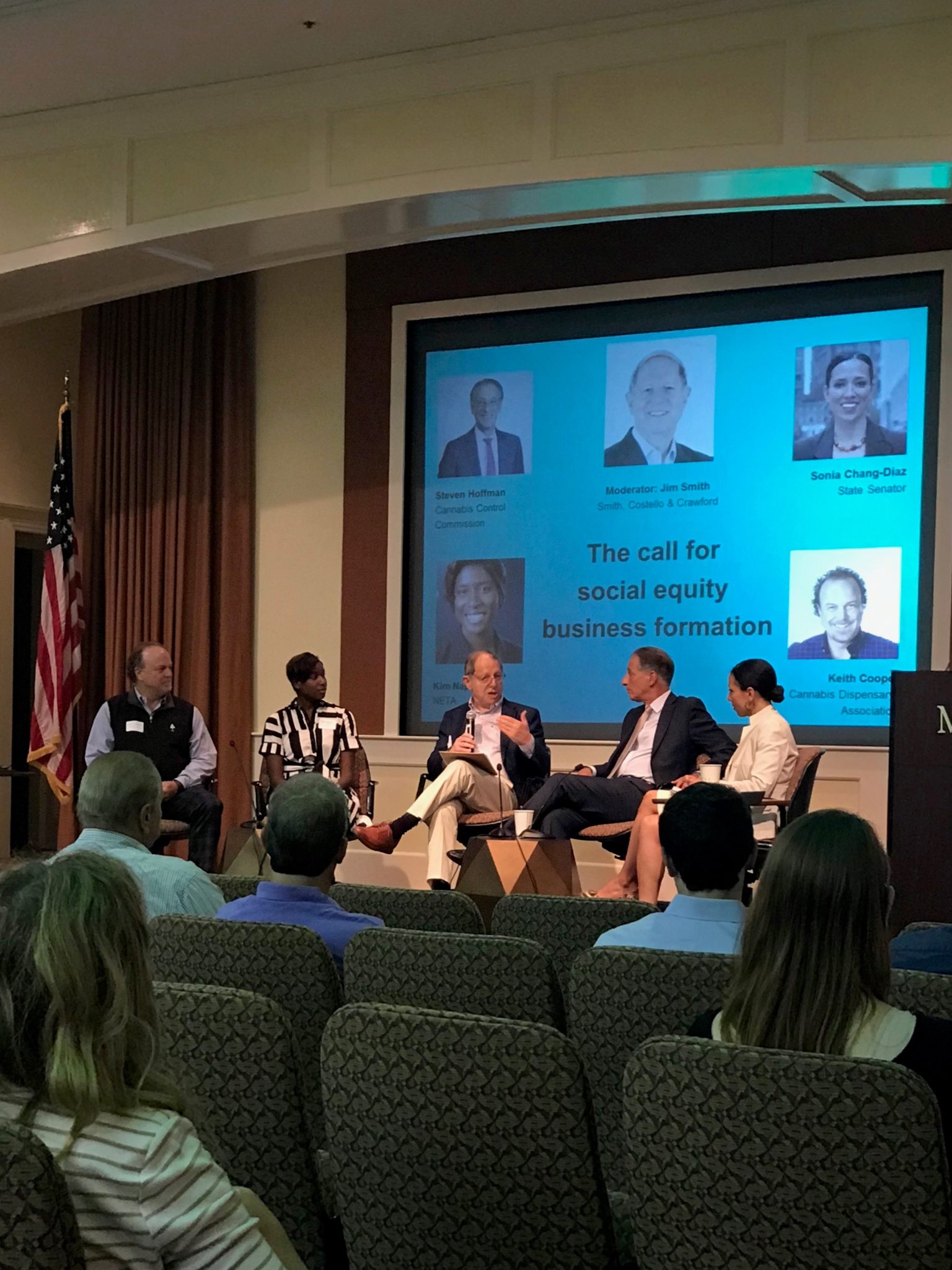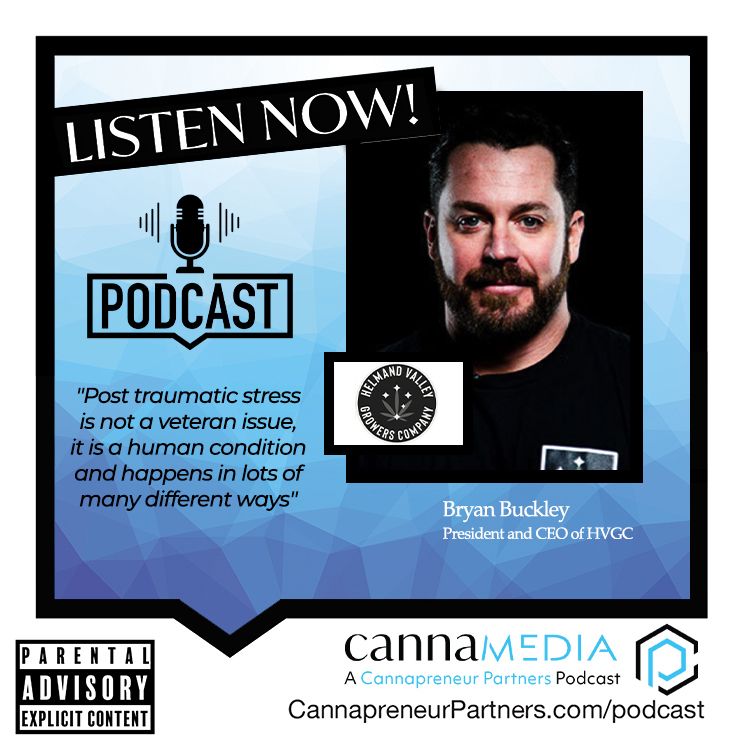State House News Forum panel discussion on social equity in the Bay State cannabis industry focused on pressing need for capital and private investment for entrepreneurial success in the Commonwealth.
The question of whether or not Massachusetts can create a model for providing “abundant entry points for minority business operators” led off Wednesday morning’s State House News Forum and cannabis industry networking event at the Massachusetts Continuing Legal Education (MCLE) center.
The panel discussion, moderated by Jim Smith of public policy law group Smith, Costello & Crawford, featured leading policy makers and local industry experts discussing key policy challenges regarding new solutions for social equity. Also discussed was the current need to create a robust entrepreneurial opportunity, so motivated investors know where to look to thoughtfully place their capital, and how proper funding and business coaching can assist those in local Bay State communities disproportionately impacted by the War on Drugs.
“In a capital-intensive industry without traditional lending options, what’s the way forward for entrepreneurial diversity?” read the event synopsis. The answers were varied but all generally echoed one another: There’s been great work so far, but much more to be done, and above all else this industry, and in particular the social equity component of the MA law, needs capital and investment to fully have this industry come to life.
Cannabis Control Commission Chairman Steven Hoffman, State Senator Sonia Chang-Diaz, Director of Diversity Programs at New England Treatment Access (NETA) Kim Napoli, and CEO of Revolutionary Clinics and President of the Cannabis Dispensary Association Keith Cooper all participated in the panel.
Kicking off the discussion, State Senator Sonia Chang-Diaz was asked what she would fix if she was personally in control of establishing the rules and laws and needs of the emerging industry in the Bay State.
“There are a lot of things we’ve done right so far,” Chang-Diaz told the crowd. “But we have very clear information: Access to capital is the big code we haven’t cracked yet. It seems simple, but simple isn’t always easy…and figuring out how to clear that last hurdle is a big task for us.”
CCC Chairman Hoffman echoed the Senator’s thought: “We have a lot of issues facing the industry but I agree that money is the most important [issue] for the industry.”
Kim Napoli spoke “as someone who worked on the [Yes on 4] campaign as Director of Outreach, and having full perspective of how things are on the ground” and reiterated the panel’s observations that finances and the need for state operators and towns to work together are paramount to jumpstarting the industry as a whole but especially for social equity and economic empowerment applicants to have a chance at their slice of the local green rush.
“In the cities and towns in which we’re operating the way forward to create the most opportunity for everyone is to let the industry thrive,” said Keith Cooper.
Cooper mentioned that even with his 35 years of business experience even he requires expensive consultants and services specific to the cannabis industry, and those without basic operational capital and resources will have an even steeper hill to climb than those with access to funding and resources.
As far as the speed and rollout of the social equity mandate written into the state law for legalizing cannabis, Hoffman said: “We’re doing social equity slowly and deliberately. There is time to do this right and we’re committed to that, but we also want to respond to the will of the voters, and they wanted adult use recreational marijuana available and accessible across the state.” Hoffman also noted that it’s estimated the industry will evolve and mature over the next five years as businesses get funded and come online, and the market begins to come to life and serve consumers.
“The demand is there,” Napoli said. “The supply is not.”
After moderator Jim Smith pointed out the local and national industry hasn’t even fully reached the starting point, a pointed question from the audience framed the slow rollout of the market – and the struggle for capital infusions for entrepreneurs (as well as social justice equalizers like expungement initiatives and social equity for minorities and communities disproportionately affected by the War on Drugs) – CCC Chairman Hoffman insisted the audience member, and anyone looking at the investment opportunity of the industry as a whole, should focus on seeing the forest for the trees.
“Capital must get in the industry,” Hoffman restated. And added “we’re not where we want to be in terms of percentages [of social equity businesses]” while reiterating how the industry is growing, and remains pleased with the gains made thus far. And more importantly, where it can go from here once capital and infrastructural challenges continue to be addressed.
“I don’t declare failure with 20 [cannabis dispensaries] open,” Hoffman stated.
Hoffman added that there are generally three things the commission hears most about why entrepreneurs haven’t applied for licenses yet. The first is the categories operators are interested in aren’t yet available (see: social consumption, private delivery service). The second is the difficulty in navigating the application process, which highlights the need for agencies to come online and help guide entrepreneurs through that. But, for Hoffman, the third and most frequently cited reason is the one everyone comes back to: lack of access to capital.
“We know that and we’re working it,” Hoffman said.
***
Be sure to sign up for Cannapreneur Partner’s email mailing list for the latest news and content from the national and international cannabis market, as well as our ongoing investor dinners and networking social pop-ups all around the state. Follow us on Facebook, Instagram, and LinkedIn.





